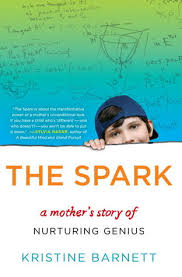Kristine Barnett’s The Spark: A Mother’s Story of Nurturing Genius

Review by Kathy Kuhl.
Kris and Mike Barnett had a bright, smart baby. Jake was sounding out short words at age one. But a few months later, he spoke less and less and stopped making eye contact. He disengaged from his family and the world. After months of in-home therapy for speech and developmental delays, Jake was diagnosed with autism.

Eight years later, Jake was taking college classes.
The Spark is a remarkable story of a profound genius. It is the story of a mother’s struggle to understand, reach, and nurture her son in spite of many different obstacles. This book can encourage and teach all parents, and especially encourage parents of struggling learners, gifted or not.
Part of the appeal of this book is the author’s frankness about profound difficulties they faced. Not only autism, but a second child born with life-threatening medical needs, unemployment, the economic crisis ravaging their community, the loss of a beloved grandparent, and the mother’s sudden and serious health problems—all these give the book the ring of real life for us parents with children with challenges. These trials help us see this is not a Supermom securing a perfect life for her children. She shows us that her husband’s deep love, insight, and humor keep her going, and that her family, heritage, and friends support them all.
The Spark reminds us to make room for childhood. Seeing her son regress at age three, despite months of special needs preschool, Kris Barnett decided he was missing childhood. Therapy can consume every hour in some families, but recalling her rich childhood, she drove her son out into the country she grew up in and gave him rich sensory experiences: swinging, dancing, stargazing, catching fireflies, She continued therapy at home, but also made room at home for family activities, building family memories. She writes:
Typical childhood experience—like watching your cold fingers wrinkle up under a sprinkler on the first superhot day of the year—are important for everyone, not just typical kids. Every family needs to have special traditions that celebrate who they are and what matters to them…. Something as simple as packing a cooler with peanut butter sandwiches and heading to the beach to fly a kite can bring a family together to make a memory. But we weren’t doing any of those things with Jake, and suddenly I realized that if I didn’t fight for my child to have a childhood, he wasn’t going to have one. (Page 49)
After starting three-year old Jake in special needs pre-kindergarten provided by the county, Kris took him home. Though she had another child and ran an in-home preschool by day, she felt compelled to undertake his therapy herself because she saw a fundamental flaw in the professional’s approach. “Why is it all about what these kids can’t do? Why isn’t anyone looking more closely at what they can do?” (Page 56)
She began therapy at home, with advice on techniques and tools from therapists who had become family friends. But unlike school, she reshaped the days to include more than just therapy. She built in lots of time to explore and encourage her son’s interests: his passions for light, pattern, numbers, and astronomy.
Since her goal was to prepare him for kindergarten, and since he could not tolerate sitting next to another child, Kris began an evening pre-kindergarten program for children with autism. Having seen kids unable to focus in therapy because they were parted from their beloved objects and interests, she organized these classes to let kids pursue their passions, not just practice classroom skills. Kris Barnett’s creativity with cast-off items and her insight into nurturing talents of all kinds, remind me of the best homeschoolers I know.
This book can inspire us whether we homeschool or not. While few have the joy the Barnetts experienced of having a child become wildly successful by age twelve (hired as a researcher at the local college!), or even have an autistic child recover to the point of spontaneously giving his mother a hug, we can benefit from following the Barnett’s journey.
The reviewer received no compensation for this review.

